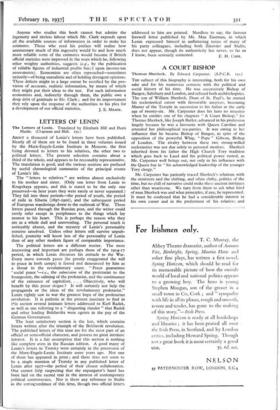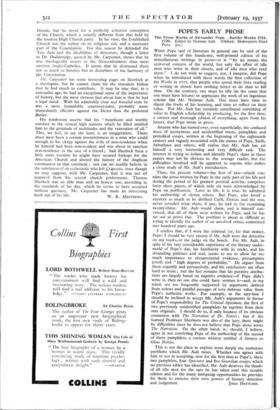A COURT BISHOP
Thomas Sherlock. By Edward Carpenter. (S.P.C.K. is.)
THE subject of this biography is interesting, both for his own sake and for his numerous contacts with the political and social history of his time. He was successively Bishop of Bangor, Salisbury and London, and refused both archbishoprics. The son of •William Sherlock, Dean of St. Paul's, he started his ecclesiastical career with favourable auspices, becoming Master of the Temple in succession to his father at the early age of twenty-six. Mr. Carpenter does his hero no injustice when he entitles one of his chapters "A Court Bishop," for Thomas Sherlock, like Joseph Butler, advanced in his profession largely because he was a favourite with Queen Caroline and attended her philosophical tea-parties. It was owing to her influence that he became Bishop of Bangor, in spite of the opposition of the powerful Whig, " Pope " Gibson, Bishop of London. The rivalry between these two strong-willed ecclesiastics was not due solely to personal motives. Sherlock inherited from his father the High Church Tory tradition which goes back to Laud and his political power rested, as Mr. Carpenter well brings out, not only in his influence with the Queen but in "his acknowledged leadership of the younger Tory clergy."
Mr. Carpenter has patiently traced Sherlock's relations with the ministers and the shifting, and often shifty, politics of the time, but no skill of narrative could make these ancient intrigues other than wearisome. We turn from them to ask what kind of man Sherlock was and what principles, if any, he represented. It must be confessed that he had a considerable interest in his own career and in the preferment of his relative 3 and
friends, but he stood for a perfectly coherent conception of the Church, which is notably different from that held by the modern High Church party. In his view, the Established Church was the nation on its religious side and a necessary part of the Constitution. For this reason he defended the Test Acts and the disabilities of dissenters, though a letter to Dr. Dodderidge, quoted by Mr. Carpenter, shows that he was theologically nearer to the Nonconformists than most modern Anglo-Catholics. It seems that he distrusted them not so much as heretics but as disturbers of the harmony of the Constitution.
Mr. Carpenter has some interesting pages on Sherlock as a theologian, but he cannot claim for the truculent bishop that he had much to contribute. It may be true that, in a rationalist age, he had an exceptional sense of the importance of history, but the most obvious fact about him is that he had a legal mind. With his admirably clear and forceful style he was a most formidable controversialist, probably more immediately effective against the Deists than the profound Butler.
His tombstone asserts that his "beneficent and worthy conduct in the several high stations which he filled entitled him to the gratitude of multitudes and the veneration of all." This, we feel, to say the least, is an exaggeration. There must have been a certain insensitiveness in a man who could inveigh to his clergy against the evils of non-residence when he himself had been non-resident and was about to sanction non-residence in the case of a friend ; had Sherlock been a little more resolute he might have secured bishops for the American Church and altered the history of the Anglican communion in that continent ; nor can we readily believe in the saintliness of an ecclesiastic who left £140,000, even though we may suppose, with Mr. Carpenter, that it was not all acquired from his several church preferments. Thomas Sherlock was an able man and an honest one, according to the standards of his day, which he seems to have accepted without question. Mr. Carpenter has made an interesting















































 Previous page
Previous page